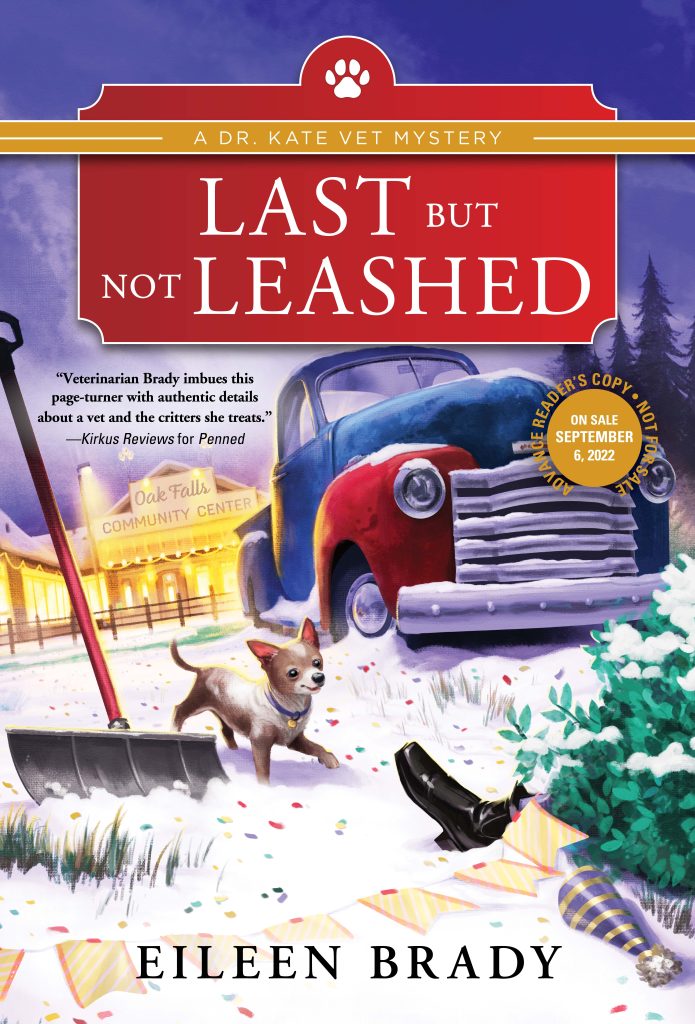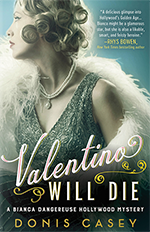I am so pleased to welcome Eileen Brady to Tell Me Your Story. Eileen is a veterinarian and writer living in Arizona. Her hobbies include gardening, traveling with her husband, and playing way too much spider solitaire. She is the author of the evocative, entertaining, funny, and touching Dr. Kate Vet Mysteries, starring Dr. Kate Turner, a young veterinarian in upstate New York. Eileen’s latest Dr. Kate Vet mystery, Last But Not Leashed, has just been released in paperback and audio, and is available from Poisoned Pen Bookstore, Amazon, or wherever books are sold. The next book in the Dr. Kate Vet Mysteries will be released in 2023. For this month’s Tell Me Your Story, Eileen has written one the best evocations I’ve read in a while of what it’s like to be a writer, and how we help and depend on each other. Her entry also provides proof of one of my true beliefs – the best writers are the best readers!

I Was A Reader First
Eileen Brady
My mom believed in the power of education. She came from a family of Irish immigrants who clawed their way into the middle class in Bay Ridge, Brooklyn. Since my father was a career officer in the USAF we moved every 2-3 years. There were very few constants in my life – but the library was one of them.
We three sisters always had library cards, and what is more unusual, the freedom to take out any books we wanted. I swiftly plowed through all the Nancy Drew and Black Stallion books and began to read more adult fiction.
Saturday morning was library day. I’d often hear comments or questions from librarians as to why this ten-year-old is taking 7 books out at a time? My mother blithely dismissed them by saying – she’s precocious.
I devoured a book almost every other day, staying up late at night and reading under the covers with a flashlight. Even then I felt a rhythm in the words.
My undergraduate degree was in English Literature. As a student I was immersed in Shakespeare, Hemingway, Faulkner and Fitzgerald. Women writers were barely mentioned, with the exception of Emily Dickinson’s poetry. Poetry was more “feminine” therefore suitable for the female mind. Could women be fiction writers? I’d have to discover Simone de Beauvoir, Sylvia Plath, the Bronte sisters, Jane Austin and so many others on my own.
Throughout college and veterinary school reading was my escape. To help relieve my jitters before exams I’d often read Agatha Christie over and over, relishing the mystery and her insertion of clues and red herrings. I believe that’s where my fondness for mysteries started.
I always wrote poetry. As a mom and practicing veterinarian I had little free time, but I’d dash off a couplet or sonnet or free-style prose usually late at night after the house was quietly sleeping. I wrote and illustrated a picture book for my youngest daughter, but that was for our family. Publishing the adventures of her stuffed animal never crossed my mind.
Still my head was always full of stories, ideas that jumped around in various forms, sometimes cinematic sometimes not. But with a full time job and a young family I rarely wrote anything down.
When my daughters were in high school I decided to take some adult education classes at Scottsdale Community College. I’d always loved learning and initially thought I’d take a class in Thai cooking. As I read through the courses offered I paused at a class called “How to write a Novel.” My older sister, Rosemary Simpson, was a published writer by then, having written 2 historical novels. If she could do it, I reasoned, so could I. So I signed up, not understanding what I was in for.
Our professor began by teaching structure. With endless arcs and circles and other geometric shapes drawn on the blackboard to illustrate types of fiction plots I simply didn’t understand what that had to do with writing. Part of the class assignment was turning in a few chapters of your “novel” a novel I didn’t have. I needed to start writing something fast.
My solution was to sit down at the computer and write using what I now know is a stream of consciousness technique. My pages were filled with grammatical errors, point of view shifts, tense issues, and every other error a beginning writer makes. I didn’t care. I’d written 100 pages and was ecstatic.
I enjoyed the first semester so much I signed on for another semester, How to Write a Novel 2. That’s when things shifted because during this semester the small class would submit pages to EVERYONE to critique, including our teacher, Rob.
I learned my perfect sentences weren’t perfect. That what sounded great in my head sounded clunky when read aloud. I was devastated, but still determined to continue because I was born stubborn, as my family will attest to.
I did discover that the more you write the more you think of other books to write. Ideas again flooded my brain, half-formed, fleeting and begging to be put down on the page. I applied for and got a job writing restaurant reviews for the Scottsdale Tribune. Since thousands of people would be reading the Sunday supplement, my anxiety level in crafting my review became palpable. Anxiety was never mentioned in my adult education classes. Nor were deadlines, or having to write something when you have nothing to say. The job of writing brought with it a demand for discipline.
One day I read an interview with Betty Webb, a well-known mystery writer based in Scottsdale. In it she discussed how helpful joining a critique group was, and mentioned her own long-running critique group. I emailed her. I was in a “seize the moment” phase, a phase where my personal trait of procrastination wasn’t tolerated.
Betty Webb answered and changed my life. My first critique by the group tested my resolve because one author eviscerated me, declaring that if this was an example of my work I’d never be published. It took a lot of strength to say thank-you when she was finished. What she didn’t know was I’d been imagining stabbing her, setting her on fire and burying her alive during her rant. Luckily my ego came out unscathed. However, it was an important lesson to learn. Some people won’t like what you write and that’s just the way it is. You’ve got to grow a thick skin as an author.
I had to sit silently during that critique but Betty didn’t. Shortly afterward she split the critique group into two, with my nemesis sailing off into her own sunset.
I’ve been in Betty’s critique group ever since and it is there that I’ve truly learned to write. Structure started to make sense. Building tension was no longer theoretical and I learned from every other writer some invaluable lessons. I went to tons of conferences, attended workshops, and slowly grew more skilled at the craft of writing. And I stayed curious about everything.
When the Poisoned Pen Press held a Discover Mystery contest in 2013 I entered with a mystery based on my life as a veterinarian. I’d been writing lackluster doomsday thrillers when Betty suggested I write about being a vet. I was astonished when I received a phone call from Jessica Tribble telling me I’d won the contest and with it, a publishing contract. I believe I said “thank-you” and hung up on her.
I’ve written 6 books in my Dr. Kate Vet Mystery series, and am on an October 1, 2022 deadline to deliver book 7. Along the way I picked up an agent (recommended by a fellow author) worked for Mystery Scene Magazine as a staff reviewer, and been featured on several panels of my own. Networking got me all of those jobs. I’ve found my fellow writers to be kind, helpful and generous.
To all those aspiring writers out there. Can I tell you how to write a novel? No. We can talk structure and discipline and trends in publishing but no one can write your novel except you. Your novel will be a reflection of you. It is you.
I’m also a reflection of where I came from. My mother’s family and their 8 children lived in a one-room shed with a dirt floor in Ireland and farmed the land. The British landowner made them sleep with the animals. My father’s mother, widowed in her fifties, supported her children by scrubbing Grand Central Station at night on her hands and knees. Born in Ireland in County Mayo she used to write at the kitchen table, her scribblings she called them. I’ve never seen any. They were discarded after her death.
One side of my family had their feet planted firmly in the ground. One side worked on their hands and knees but still looked up at the stars.
I can’t talk about writing without mentioning publishing. American publishers are consolidating, with many small presses being gobbled up by larger ones. The business aspect often outweighs the creative as the question “Will it sell” becomes the main question. Wonderful writers are dropped by publishers for lack of sales. Social media has also become more important as naturally reluctant authors try and promote themselves. To make things worse now your competition includes dead writers, whose estates hire ghost- writers to write in the “style and spirit” of the deceased. Sometimes it feels as though you can’t catch a break.
But writers must write. All you can do is your best. Learn from others, be humble sometimes and know you are in for an emotional ride. Luck might shine on you. As Mel Brooks famously said, “You could be Tolstoy or Fanny Hurst.” The joy of writing something that works, that moves a reader and for a moment makes a difference in someone’s life is priceless and fleeting. Paradoxically, 100 good reviews are canceled by that one bad review. It might take you six months or six years of your life to write a book. Then, like one of your grown children, it must make its own way.
It doesn’t get any easier, at least not for me. The other day I told my husband how happy I was with the pages I wrote. They were good. I felt invincible. Twenty minutes later I complained that my writing sucked and I was depressed.
“I don’t understand?” he said.
“I’m crazy,” I told him. “What do you expect? I’m a writer.”
___________________
Contact Eileen at eileenbradymysteries@gmail.com




September 20th, 2022
Donis,
I really enjoyed this article about our Eileen.
Ruth
September 21st, 2022
Eileen, I absolutely love your writing. Your sentences seem to flow like beautiful poetry. I anxiously await your newest novel.
September 27th, 2022
Inspiring to get these vivid images of your journey as a writer, Eileen. Thank you!